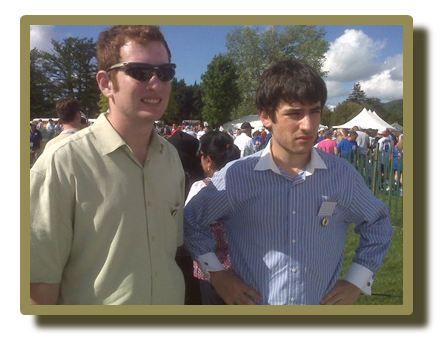Editors Note: This blog is part of a special series on dads which originally ran in 2012. Because it is timeless we are sharing it again.
Being the father of an athlete is a challenging yet rewarding role. At MomsTEAM we think sports dads deserve to be honored, not just on the third Sunday in June, but for an entire month. So we have designated June as National Sports Dads Month and invited some veteran sports dads to share their wisdom by responding to a series of questions.
Today, we hear from sports journalist Mark Hyman: 
MomsTEAM: Were you an athlete and what sports did you play as a youth (under 19)?
Hyman: I played organized baseball from age eight (in the pre-T-ball era) through high school. When my parents built their home in Freehold, New Jersey, they bought an adjacent lot that became our neighborhood gathering place and sports field. We had as much fun playing sports there as we did in the real games - maybe more.
MomsTEAM: What is the most rewarding aspect of being a sports dad?
Hyman: I recall asking my father the same question for a story that I did about fathers and sons for NPR about ten years ago. The occasion for the story was a surprise trip my brothers and I gave my father to the Cal Ripken Baseball Fantasy Camp - he was 83 at the time. My dad said then - and I agree to a point - "Sports was the language that we all spoke. It was our common ground. Without it, what would we have talked about: Cutting the grass?" In our home, my sons (now 24 and 21) and I talk about politics, movies and more. We also talk a lot about the Orioles. It's our common ground. We never talk about cutting the grass.
MomsTEAM: What is the most important lesson your child is learning from his/her sport?
Hyman: A few years back, my son Ben reflected on playing baseball. He wrote: "It was a sport meant for me: a tall, slow kid who wasn't good enough to play on any other team in high school. With practice, I could be just as good as the more athletic kids at the skills of hitting and throwing a baseball." I don't particularly agree with that self-assessment. (Ben was an All-Conference player as a high school senior). It does remind me that Ben worked hard to become as good as he possibly could be. That's a good life lesson.
MomsTEAM: What lesson has your sports active child taught you?
Hyman: When my son Ben was 13 and a pitcher for a youth baseball team that I was coaching, he came to me after a game with (for him) an unusual admission. His pitching shoulder was tired and sore. I should have said: You've had a great season. You're out for the next two weeks, and maybe longer. What I actually said was: The playoffs begin on Wednesday. Let's see if you can pitch two innings. Two days later he was our starting pitcher. He threw a handful of pitches, laboring with each one. At that point I removed him from the game and sat him down on the bench. I'd finally gotten it right. I'd made a terrible mistake that day and knew it. My son's youth sports life had become too much about my ambitions, not enough about healthy recreation for him. That experience was a reset for me. Now in my writing and on the Little League board on which I sit, I speak up in favor of a "kid centric" approach to youth sports. It sounds self-evident, and it is. Yet I wonder about the decisions we make without truly considering the effects on the kids on the field, on the court, in the pool.
MomsTEAM: If you could "flip a switch" and change one thing about the culture of youth sports what would it be?
Hyman: What if all 41 million youth athlete in the U.S. observed this simple rule: Only play your sport during the traditional season for that sport. Soccer would be a fall sport only. Basketball would take over during the winter months. Baseball and lacrosse then picked up in the spring. So on and so on. Here are some of the many positives that would result from this change. Early specialization (playing one sport year-round) no longer would be a temptation for many parents. The things that drive many kids out of sports prematurely also would be greatly reduced. There would be many fewer overuse injuries - the strained elbows, sore knees and more severe injuries. Emotional burnout from playing a single sport month after month without a break also would be less a problem. Our kids would be more likely to remain active in sports as young adults rather than dropping out and perhaps not finding their way back. This would be a big "switch to flip" and it's a highly improbable dream. But what a difference it would make.
Mark Hyman is a sports journalist whose books on youth sports are Until It Hurts and The Most Expensive Game in Town. He is co-author with Dr. Robert Cantu of Concussions and Our Kids, which will be published in September. Mark teaches in the sports management program at George Washington University. You can follow Mark on Twitter @sportsparents.



















